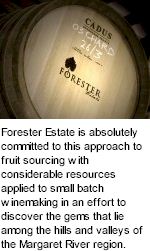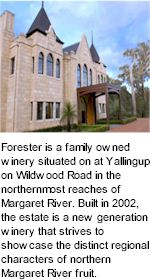


Built in 2002, Forester Estate is a new generation winery that strives to showcase the distinct regional characters of northern Margaret River fruit. The Estate is surrounded by huge Eucalypt trees that once supported a thriving forestry trade established in the 1850s. This forestry industry was the first to open up rugged land along the Leeuwin Naturaliste ridge and provide jobs for many of the new arrivals.The property has a saw pit that was used by the original pioneers to mill timber which was transported by ox and cart to Yallingup Siding, the nearby railway station. This timber, especially the hardwood Mahogany (Jarrah), was shipped out from Geographe Bay to countries around the world. Even today, many streets of London lie on the Jarrah trees milled from the forests of Margaret River. It is from this heritage that the name Forester Estate is derived.

Forester Estate have built relationships with a number of key growers to ensure access to older vineyards. Considering that Margaret River is only 40 years old as a commercial wine growing region, vines greater than 20 years of age are considered mature here! Sourcing fruit from up to 14 vineyards in a given vintage allows plenty of options. Forester's Home vineyard was historically referred to as Redland Valley. It was planted on an open lyre trellising system in 1995. The property runs north-south up the eastern flowing Wildwood Valley. The open lyre trellis demands more manual labour and less machinery doing the work. The resulting decreased vigour and increased sunlight penetration provide unique fruit qualities that favour riper fruit spectrums and fully developed tannins.
Each property has unique site characteristics that are reflected in the fruit it grows. In some cases individual blocks of fruit on the one vineyard are picked in stages to further isolate subtle soil boundaries impacting on fruit quality. These unique site characteristics of soil composition, aspect to the sun, drainage patterns and climate all interact in almost magical ways to stamp a vineyard’s fruit with a certain quality.
There is a growing trend for Australian producers to focus more specifically on small, unique vineyard blocks with exceptional terroir to create their premium and ultra-premium wines. Forester Estate is absolutely committed to this approach to fruit sourcing with considerable resources applied to small batch winemaking in an effort to discover the gems that lie among the hills and valleys of Margaret River.

With lower rainfall and higher sunshine hours than the southern end of the region, and being impacted by the large body of warm water in Geographe Bay to the northeast, the Yallingup sub region lends towards riper, fruitier white wines and finely structured elegant reds. Finding good vineyard sites is a big part of the quality pie, but it is not all of it. Viticultural management practices are crucial to the maximizing of fruit potential and to the protection of Forester’s assets in years of adverse weather or strong disease pressure.
The decisions that can be made in establishing a new vineyard are endless, however once well established the approach to each vineyard is more or less the same – minimal inputs for the most natural output attainable. Irrigation is only used if absolutely required to keep vine health at an optimum. Forester's white wines consistently exhibit delightful fresh and lively fruit flavours balanced with crisp acidity and deliver a delicious, lingering, dry finish. White grapes are either hand or machine picked and transported the short distance to the winery for rapid chilling and processing. Tremendous varietal character, excellent balance and complexity, subtle oak and a lovely soft tannin finish typify Forester’s reds. Machine harvesting is not possible on the intensive open lyre trellis design. On selected parcels chilling may be employed before a long cold soak at the start of a ferment, however the typical approach is to crush to a small open fermenter and inoculate with yeast immediately.
Forester Estate sources its fruit predominately from the most northern sub-region in Margaret River, Yallingup. Chemical inputs are extremely low and again only used as a supplement to physical forms of pest and disease management. Forester Estate houses the best of new technology which is coupled with proven traditional winemaking techniques to ensure the exceptional quality grown in the vineyard is preserved in the finished product. The goal is always to let the vines find a natural balance in the dirt they call home and then to assess the fruit on its merits.
